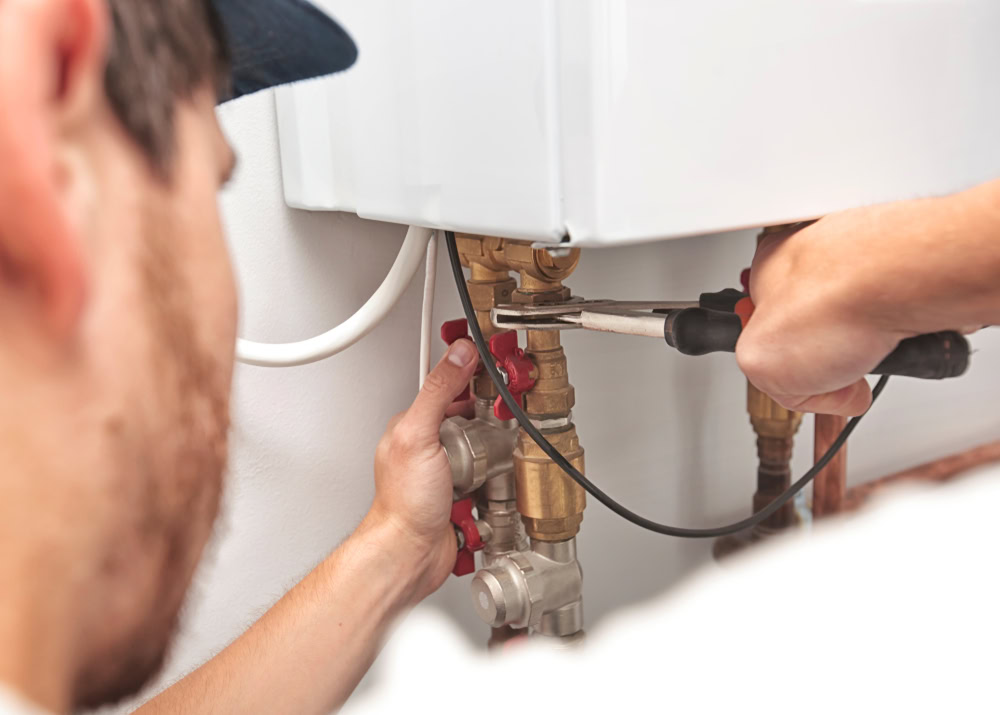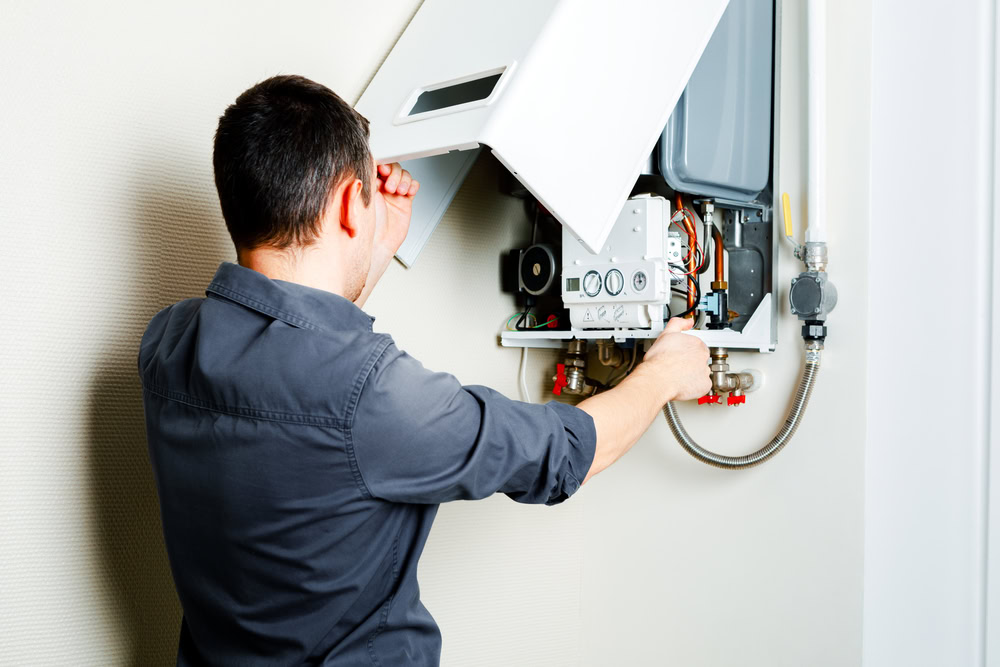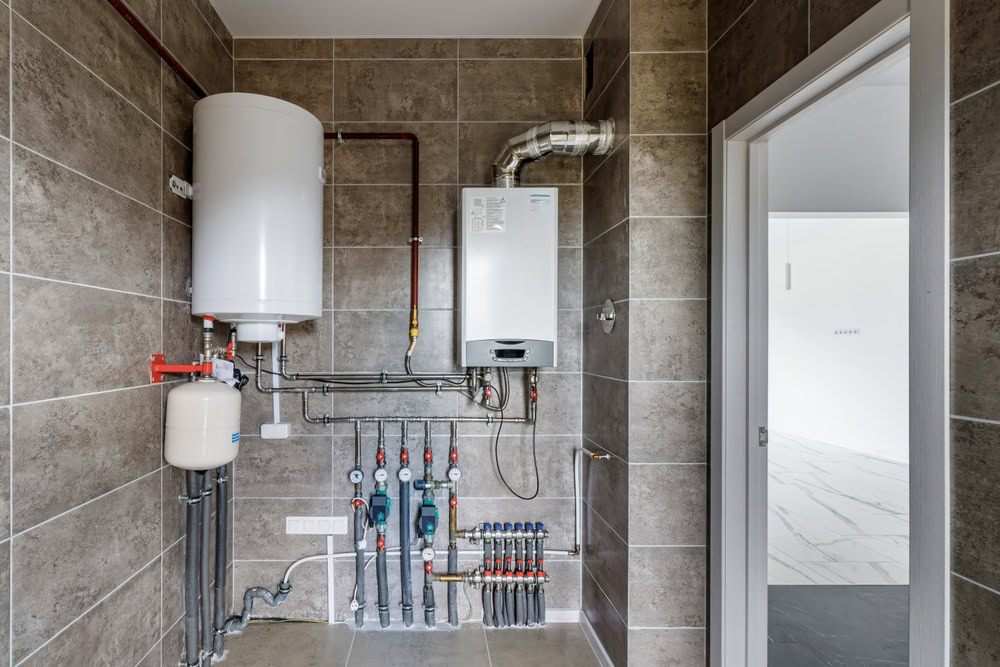Summary:
Emergency Boiler Repair: What to Do When Your Heat Goes Out
When your boiler stops working, your first instinct might be panic. But most heating emergencies have simple causes you can check before calling for emergency boiler repair service.
Start with your thermostat. Make sure it’s set to heat mode and the temperature is higher than the current room temperature. Check if the display is blank, which could mean dead batteries.
Next, look at your circuit breaker panel. Boilers need electricity even when they run on gas or oil. A tripped breaker is an easy fix that saves you an emergency service call.
Gas Boiler Repair: Safety Checks Every Homeowner Should Know
Gas boiler repair requires extra caution because you’re dealing with natural gas. Never ignore the smell of gas around your boiler. If you smell gas, don’t flip switches or use anything that could create a spark.
Turn off the gas supply to your boiler if you can do so safely. The shutoff valve is usually located on the gas line leading to your unit. Turn it perpendicular to the pipe to shut off the gas flow.
Check your pilot light if you have an older boiler. A blown-out pilot light is common during windy weather or when there are drafts near your boiler. Most newer boilers have electronic ignition systems that don’t require manual lighting.
Look at your boiler’s pressure gauge. Most residential boilers should read between 12-15 PSI when cold and 15-20 PSI when hot. Low pressure often means you have a leak somewhere in your system. High pressure could indicate a faulty pressure relief valve.
Your boiler’s exhaust flue needs to stay clear. Check outside to make sure snow, ice, or debris isn’t blocking the vent. A blocked flue can cause carbon monoxide to back up into your home, which is extremely dangerous.
If your boiler keeps shutting off, it might be overheating due to poor circulation. Check that all your radiator valves are open and that furniture isn’t blocking your radiators or baseboard heaters.
Oil Boiler Repair: Common Issues and Quick Fixes
Oil boiler repair often involves fuel delivery issues that you can troubleshoot yourself. Check your oil tank gauge first. Many “boiler failures” are simply empty oil tanks. If you’re low on oil, schedule a delivery before you run completely dry.
Look at your oil filter. A clogged filter prevents fuel from reaching your boiler’s burner. Most homeowners can replace a standard oil filter, but make sure you have the right size and type for your system.
Check the reset button on your boiler. It’s usually red and located on the burner assembly. Press it once and wait to see if your boiler starts. Never press the reset button more than twice, as this can flood your combustion chamber with unburned oil.
Your oil boiler needs adequate airflow to burn fuel efficiently. Make sure your boiler room isn’t cluttered and that air vents aren’t blocked. Poor airflow causes incomplete combustion, which creates soot buildup and reduces efficiency.
Water in your oil tank is a common problem, especially in older tanks. Water causes your burner to sputter and can damage your fuel pump. If you suspect water contamination, you’ll need professional service to drain and clean your tank.
Listen to your boiler when it’s running. Unusual noises like banging, whistling, or grinding often indicate specific problems. Banging usually means trapped air in your system. Whistling might indicate a pressure problem. Grinding sounds often point to pump or motor issues that need immediate attention.
Boiler Replacement vs Repair: Making the Right Financial Decision
The biggest question homeowners face is whether to invest in boiler repair or bite the bullet on a full replacement. This decision impacts your comfort and budget for years to come.
Age is your first consideration. Most boilers last 15-20 years with proper maintenance. If your boiler is over 15 years old and needs major repairs, replacement often makes more financial sense.
Consider your recent repair history. If you’re calling for boiler service multiple times per season, those costs add up quickly. Frequent breakdowns also mean you’re more likely to be without heat when you need it most.
Boiler Service and Maintenance: Preventing Expensive Repairs
Regular boiler maintenance prevents most emergency repair calls and extends your system’s lifespan significantly. Annual boiler service should happen before heating season starts, typically in early fall.
During professional boiler service, technicians clean your heat exchanger, which improves efficiency and prevents carbon monoxide buildup. They’ll also test your safety controls to make sure your boiler shuts down properly if something goes wrong.
Your boiler’s water treatment matters more than most homeowners realize. Hard water causes scale buildup that reduces heat transfer and can crack your heat exchanger. A water treatment system protects your investment and improves efficiency.
Bleeding your radiators removes trapped air that prevents proper heat circulation. You’ll hear gurgling sounds or notice cold spots on radiators when air is trapped. Most homeowners can handle this simple maintenance task themselves.
Check your boiler’s water level regularly if you have a steam system. Low water levels can damage your boiler and create safety hazards. The water level should be visible in the sight glass when your system is running.
Your thermostat affects your boiler’s performance too. Programmable thermostats reduce wear and tear by avoiding constant temperature adjustments. They also save money by automatically lowering temperatures when you’re sleeping or away from home.
Boiler Troubleshooting: When to Call Professionals in Nassau County
Some boiler problems require professional diagnosis and repair, especially in Nassau County and Queens where many homes have older, complex heating systems. Knowing when to stop troubleshooting and call for help prevents dangerous situations and costly mistakes.
Call for professional boiler repair immediately if you smell gas, suspect a carbon monoxide leak, or notice water leaking from your boiler. These situations can become dangerous quickly and require trained technicians with proper equipment.
Electrical issues also need professional attention. If your boiler’s control panel isn’t responding, or if you’re experiencing frequent electrical trips, don’t attempt DIY repairs. Boiler electrical systems are complex and potentially dangerous.
Strange noises that persist after basic troubleshooting indicate internal mechanical problems. Grinding, screeching, or loud banging sounds often mean worn pumps, motors, or damaged internal components that need professional replacement.
If your boiler runs but doesn’t heat your home evenly, you might have circulation problems that require system balancing or pump replacement. This type of boiler service requires experience with hydronic heating systems common in older Nassau County and Queens homes.
Efficiency problems are harder to diagnose without proper testing equipment. If your heating bills have increased significantly without changes in usage, professional boiler service can identify whether you need repairs or if replacement makes more sense financially.
When choosing boiler repair service in Nassau County or Queens, look for contractors who understand local building codes and have experience with your type of system. Many homes in these areas have older boilers that require specialized knowledge and parts availability.
Getting Reliable Boiler Repair Service in Nassau County and Queens
Your boiler keeps your family comfortable through New York’s harsh winters, and knowing how to handle problems saves you time, money, and stress. Remember that simple troubleshooting can solve many issues, but safety always comes first.
Regular maintenance prevents most emergency situations and helps you make informed decisions about repair versus replacement. When you do need professional help, choose contractors who understand local systems and provide honest assessments.
For reliable boiler repair, maintenance, and replacement services throughout Nassau County and Queens, we at Excellent Air Conditioning and Heating Service provide the expertise and transparency you need to keep your home comfortable year-round.





